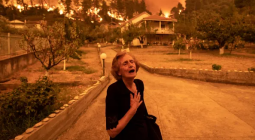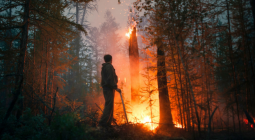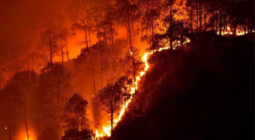The entire Mediterranean region is burning. Here’s why it will get worse
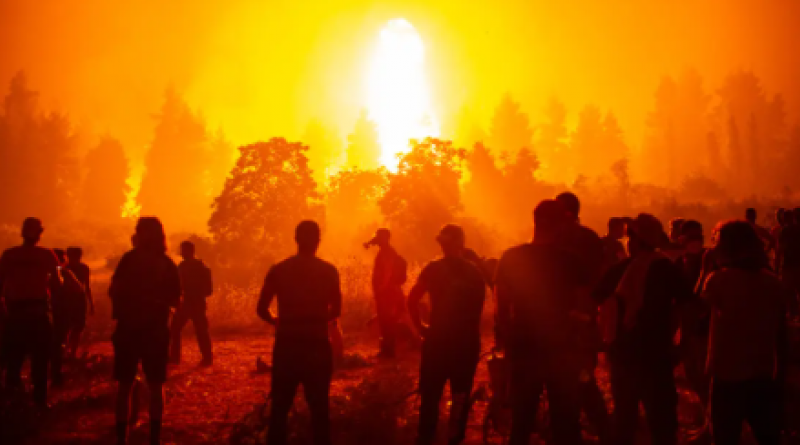
It is the storied sea traversed by Odysseus and the Vikings, a body of water that has been the wellspring of civilisations, culture and commerce as well as countless myths and legends. It is the holiday destination for millions of people who enjoy its splendid beaches, verdant islands and ancient ruins.
But the Mediterranean Sea littoral is turning into a wasteland, as shown by the vast fires engulfing parts of Greece, Turkey, Italy, Algeria and Tunisia.
“It’s going to be a desert climate all around the Mediterranean by the end of the century,” says Levent Kurmaz, head of the Centre for Climate Change and Policy Studies at Istanbul’s Bogazici University.
Scientists say the region’s unique geographic location – a body of water sandwiched between three giant land masses – makes it particularly vulnerable to climate change. The region is already outpacing global average temperature increases by more than 20 per cent since the end of the 19th century. Researchers have detected numerous disturbing patterns that have included hotter temperatures and altered rainfall patterns.
“I am definitely seeing varying trends in the Mediterranean basin in terms of droughts getting harsher [and] a bit more unpredictable and frequent, average temperatures increasing and extreme heat waves,” says California-based climate researcher Gokce Sencan.
Fires have laid waste to tens of thousands of hectares of woodland in vast stretches along the Mediterranean coast in the past few weeks. At least eight people have died in Turkey, where fires have been concentrated in the southwest. Four people have been killed in wildfires in the wooded mountain region of Kabylia in Algeria, east of the capital.
Tunisia’s Bizerte province was hit by a wildfire on Monday amid strong winds and temperatures blasting as high as 122F (50C). Morocco suffered wildfires in July that destroyed 1,200 hectares of forest.
Greece’s prime minister Kyriakos Mitsotakis said 586 fires had erupted over the last week throughout the country.
“It is a disaster without precedent,” said Christian Solinas, the governor of the Italian island of Sardinia.
The fires have displaced thousands, scorched treasured forests, and killed untold numbers of living creatures.
“Tens of thousands of animals died in the fires for no reason,” says Emir Eksioglu, an environmental activist in Turkey. “Bears, deer, squirrels, pigs, turtles. People’s love for animals gives me hope. But I do not see the same hope in government policies.”
Though Spain and Portugal have been spared the worst of the wildfires so far this year, Professor Kurmaz cautions that anticipated hot temperatures could prompt severe blazes in the Iberian peninsula as well.
"People in Italy think it’s the mafia. People in Greece think it’s the Turks. People in Turkey think it’s the PKK. But no one stops to think: did they all organize to start the fires around the same week? People don’t like to focus on the big picture."
Though rising atmospheric temperatures are contributing to drier forests more susceptible to wildfires, uncontrolled land-use has exacerbated the problem, says Irem Daloglu Cetinkaya, an environmental scientist at Istanbul’s Bogazici University.
“These forest fires are not only because of the changes in climate,” she says. “There is also the accumulation of too much garbage, and land-use changes and development. There are two things happening at the same time.”
Experts have warned of the potential effects of rising temperatures on the Mediterranean for years. A study prepared last year by McKinsey and Associates forecast rising numbers of heatwaves, increased drought and decreased precipitation, devastating food production and decimating tourism throughout the Mediterranean states.
“The Mediterranean basin is often perceived as the ultimate in climate, comfort and culture,” said the report. “However, climate change may harshen the Mediterranean climate and disrupt vital industries such as tourism and agriculture.”
In a separate study published last year, a pair of MIT (Massachusetts Institute of Technology) scientists argued that the unique location of the Mediterranean made it particularly vulnerable to climate change. While rising temperatures will be coupled with increased rainfall throughout much of the world, the Mediterranean is being saddled with both hotter and drier weather.
Wind patterns create a natural high-pressure system associated with hot dry weather over the Mediterranean. Meanwhile, the temperature differential between land and sea is closing faster in the Mediterranean than other places because it is surrounded by three land masses.
“What’s really different about the Mediterranean compared to other regions is the geography,” researcher Alexandre Tuel told an MIT journal. “Basically, you have a big sea enclosed by continents, which doesn’t really occur anywhere else in the world.”
Professor Kurmaz, whose team is about to release a paper on wildfires, predicts that by the century’s end, the climate in southern Turkey, southern Greece and southern Italy will be similar to that of Cairo and the southern Iraqi city of Basra now.
“We’re moving towards that,” he says. “It’s not going to happen overnight.”
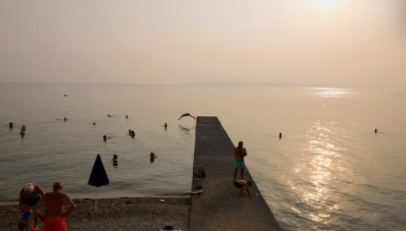
(AP)
Scientists say governments can make efforts to mitigate, accommodate, and perhaps even reverse some of the disastrous changes. Turks have criticised their government for failing to allocate enough planes specialised in putting out forest fires, and for refusing to recognise the local version of the environmentally focused Green Party, which Ankara does not recognise as an official political grouping despite surging support for the party in opinion polls.
Governments can also limit development on vulnerable land and protect undisturbed green spaces. “We interfere in the forest areas,” says Ms Cetinkaya. “We use them for recreation. We pollute them. Climate change is kind of unavoidable, but we can reduce the impact of it.”
But instead of coming to grips with the reality of the changing climate, those living in the wildfire-stricken countries are instead casting about for conspiracies. Some Turks, for example, have alleged that Kurdish separatists associated with the Kurdistan Workers’ Party (PKK) set the fires.
“People in Italy think it’s the mafia,” says Ms Sencan. “People in Greece think it’s the Turks. People in Turkey think it’s the PKK. But no one stops to think: did they all organize to start the fires around the same week? People don’t like to focus on the big picture.”
11 August 2021
INDEPENDENT

